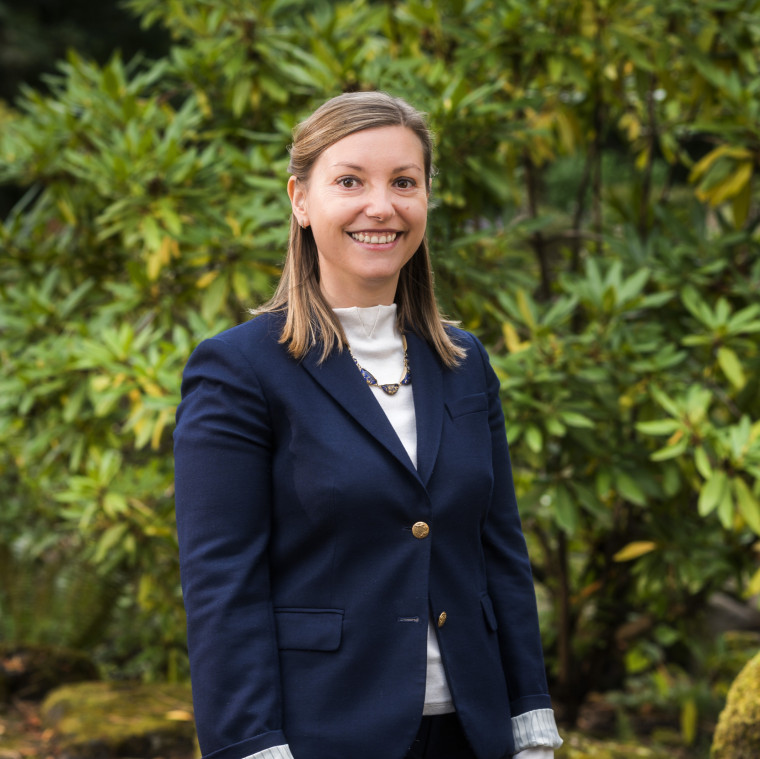Maria (Masha) Hristova
Strong faculty support and rigorous academic expectations for second (and third) language acquisition help students achieve whatever they set their minds to do.

Pronouns
Title
Department(s)
What three words would you use to describe Lewis & Clark?
How do you describe the liberal arts?
The liberal arts are our window to the world. By engaging with a wide range of
classes from different disciplines, we can learn about the world beyond our
immediate experiences, including the different cultures that are part of our global
community. In turn, the process of learning makes us more thoughtful,
resourceful, and empathetic.
What do you enjoy most about Lewis & Clark students?
I love our students’ curiosity about other cultures and enthusiasm for study abroad. As someone who grew up in one country, but has lived in several different ones, I am very appreciative of how difficult but also enriching it is to face daily life in a language and culture not your own. I feel incredibly motivated, both professionally and personally, when meeting students who understand this and actively look for experiences that challenge and help them grow. Additionally, having students who choose to self-study and do extracurricular activities because they enjoy learning makes me want to keep improving as an instructor.
How does Lewis & Clark prepare students interested in your field to pursue
a career and/or advanced studies after graduation?
One of the main advantages of the liberal arts is that you get as much individualized support as you ask for. We spend a lot of time with our students, mentoring, brainstorming, coaching, and going over resumes and statements. Strong faculty support and rigorous academic expectations for second (and third) language acquisition help students achieve whatever they set their minds to do: spend time abroad through Fulbright scholarships or other prestigious programs, go to graduate school, pursue an internship, and get jobs in translation, analytics, social work, or other fields.
What sets your department or program apart from other small liberal arts
colleges?
One of the distinguishing features of Russian at L&C is that we regularly offer advanced-level seminars on a wide range of literature and culture topics in Russian. This is quite rare for a small school in the Pacific Northwest. Advanced seminars, combined with study abroad, are what helps students transition from functional to fluent, and it allows them to understand and navigate the various cultures where Russian is spoken. Additionally, we have a very active student-run club, which regularly networks with the other clubs and L&C’s graduate school and law school to get as many people as possible to learn about Russian literature, film, music, and food.
What brought you to L&C?
I am a big supporter of study abroad. I also wanted to work at a small school where I could really get to know my students. My own time at a small liberal arts college was transformative and deeply enriching, and my goal is to contribute to a similar experience for our students.
What’s your favorite thing about living in Portland?
Being in a city with its own cultural life and a well-connected airport but still having the small campus experience and access to all of the Pacific Northwest.
What should incoming students know about your research?
Currently, I am researching the genesis of Soviet environmental writing in the post-WWII period and its impact on contemporary eco literature and film. One of my projects complicates the 1950s and 1960s village prose narratives of countryside life by considering the voices and stories of women writers who have been largely excluded from critical studies until recently. My other project examines the representation of nuclear bomb testing in post-Soviet film and TV. This topic is particularly relevant at a time of energy crisis when nuclear power is once again framed as a safe alternative to fossil fuel, while also being used as a bargaining tool in international conflicts.
More Admissions Stories
Admissions is located in Frank Manor House on the Undergraduate Campus.
MSC: 32
email admissions@lclark.edu
voice 503-768-7040
fax 503-768-7055
Vice President of Admissions and Financial Aid
Eric Staab
Admissions
Lewis & Clark
615 S. Palatine Hill Road MSC 32
Portland OR 97219

